AI companies in Germany: Top names to watch in 2026
Written by
Kinga EdwardsPublished on
Curious about the AI landscape in Germany? Check out our list of the top companies to watch in 2026 and see who’s leading the charge in innovation!

AI in Germany is moving fast. For years, people looked mostly at Silicon Valley or Shenzhen, but the German scene has been quietly building up its own strength. Now it’s at a point where you see research, startups, and big corporations pulling together. The mix is unique: world-class universities, an industrial base that loves efficiency, and a government that actually pushes for trustworthy, Europe-first AI.
What makes it exciting in 2026 is the scale. These aren’t small labs testing prototypes anymore. Just see.
The state of AI in Germany
If you zoom in on the German AI map, a few hubs jump out. Berlin is the hotspot for startups, attracting young teams and investors. Munich is where enterprise AI thrives, with links to manufacturing and automotive giants. Heidelberg is pulling ahead in AI research, feeding talent and ideas straight into commercial projects.
Policy also plays a role. The EU AI Act is setting the tone, and Germany is leaning into it, branding itself as the place for responsible, trustworthy AI. Instead of chasing consumer hype, many German players go deep into applied solutions. Think industrial automation, healthcare diagnostics, or language tools with privacy in mind.
Here’s a stat that gives context: Germany hosted around 687 AI startups in 2024, up 35% from the previous year. And half of them is based in Berlin and Munich alone. On the market side, AI in Germany generated $15,456.5 billion in revenue in 2023, and it’s expected to climb to over $106 billion by 2030. That’s a solid ~32% annual growth.
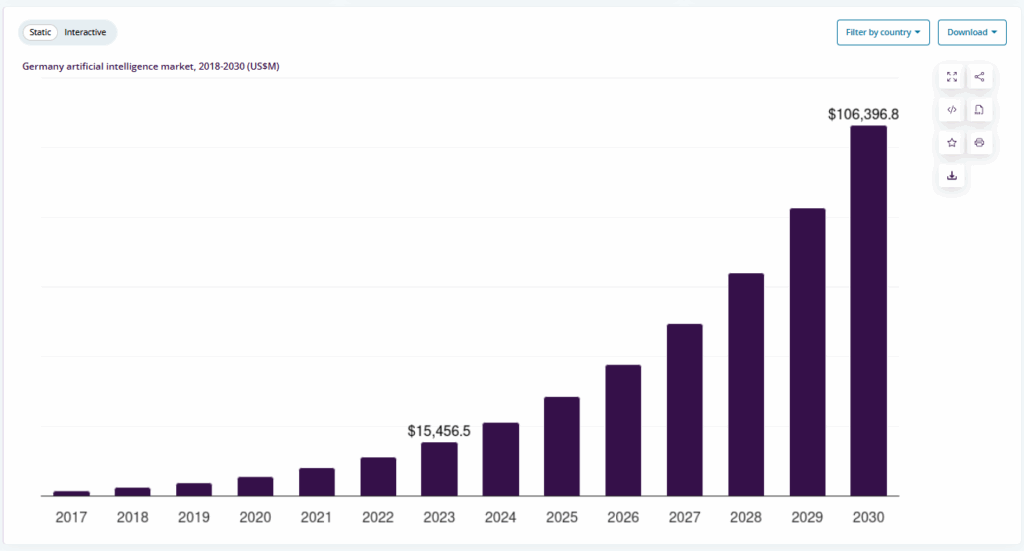
It all adds up to a market that feels solid. AI in Germany is about solving problems, scaling businesses, and building tech that companies can actually trust. That’s why 2026 could be the breakout year for many of these names.
What makes German AI different
While a lot of the world’s attention goes to shiny consumer apps, AI companies in Germany are far more grounded. Their focus is enterprise and B2B – almost 19% of industrial and industry-related services companies in Germany already used AI by 2022. You’ll see solutions that run factories smarter, help doctors read scans faster, or make banks safer against fraud. It’s practical work that quietly reshapes industries.
Another thing that stands out is the mix of science and business. Universities in Berlin, Munich, and Heidelberg are constantly feeding talent into startups and corporates. Spin-offs are common, and research doesn’t get stuck in papers – it finds its way into products.
And then there’s the corporate side. Big German names in automotive, finance, and healthcare aren’t standing on the sidelines. They’re teaming up with startups, investing in AI ventures, and sometimes even co-developing solutions. For a founder, landing a partnership with Siemens or Allianz is not a far-off dream.
Top AI companies in Germany 2026
So who’s actually shaping the future here? The list is long, but a few names rise to the top. These are the AI companies in Germany that stand out in 2026 for their products, their vision, and the industries they’re transforming.
#1 SAJOKI
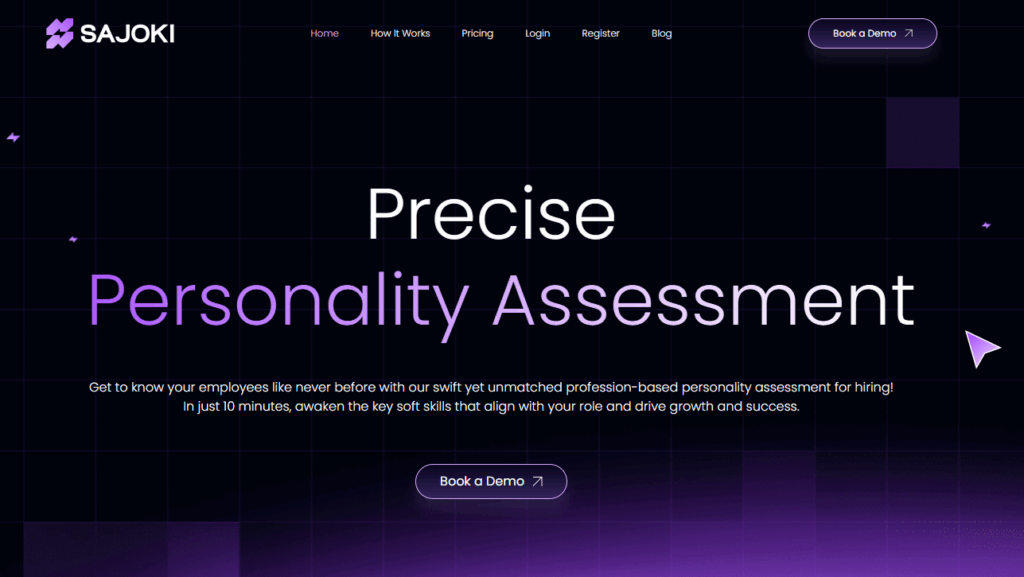
Based in Berlin, SAJOKI is changing how employers think about soft skills. Instead of relying only on resumes or gut feelings, recruiters can use its AI-driven tests to get a deeper picture of candidates. The platform builds job-specific questions on the spot, digs into personality insights, and makes comparing applicants a whole lot faster. And the interface? As simple as flipping open your inbox, so teams can jump in without training.
#2 Infarm
Agriculture gets smarter with Infarm. This Berlin company built its reputation on vertical farming that saves space, water, and energy, and it leans heavily on AI to make it work. Sensors track the tiniest changes, feeding data into a central system that knows exactly how to adjust light, water, and nutrients. For a country where sustainability is fundamental, Infarm shows how tech can keep food supply local and efficient.
#3 Aleph Alpha
If you’ve heard people call Aleph Alpha the “German OpenAI,” they’re not far off. This Heidelberg-based player is serious about large language models and transparency. Their platform, PhariaAI, pushes for explainable outputs and compliance—something European enterprises care deeply about. With multilingual capabilities and advanced control models, Aleph Alpha is carving out a spot as the LLM provider that businesses can actually trust.
#4 Helsing
Defense isn’t the first place most people think of when they hear AI, but Munich-based Helsing is proving how critical it can be. Their tech focuses on situational awareness – it gives militaries tools to process information quickly and act decisively. Systems like Altra and Centaur mix human expertise with machine learning to make decision-making sharper.
#5 DeepL
Anyone who has tried DeepL’s translator knows how natural it feels. This Cologne company started with translation but is edging toward broader language AI. They’ve mastered the balance between accuracy and fluency, helping users across 30+ languages write, edit, and even translate entire documents without losing tone. Add an API that companies can plug straight into their systems, and it’s clear why DeepL is one of the most trusted AI names in Germany.
#6 Cognigy
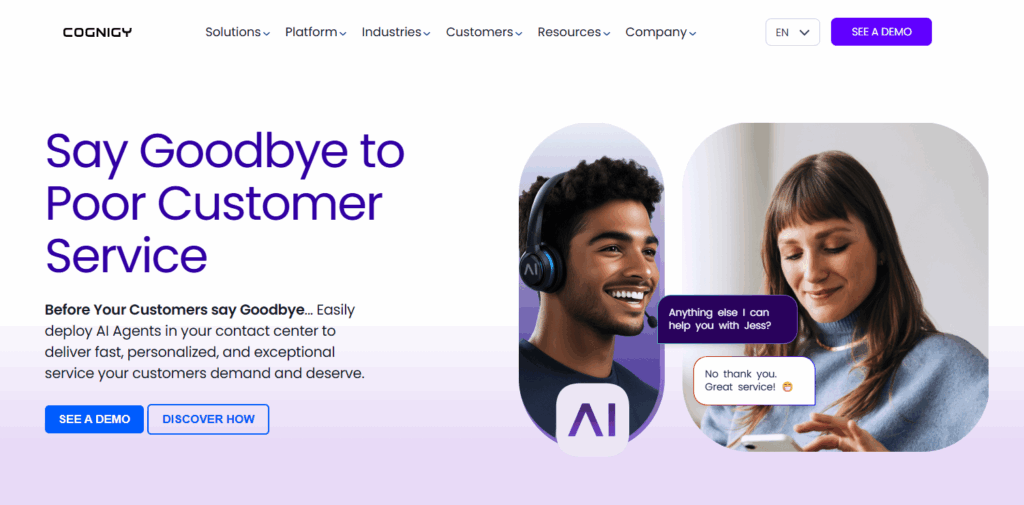
Chatbots may have felt like a 2022 fad, but Cognigy in Düsseldorf proves they’re here to stay. Their platform powers voice and text agents that don’t just spit canned replies – they actually handle complex customer service conversations. Businesses can design and roll out agents without deep coding knowledge, and the system keeps improving through generative AI. For customer-facing teams, it’s like adding a 24/7 colleague who never takes a coffee break.
#7 Ada Health
Healthcare meets AI with Ada Health, headquartered in Berlin. Their app guides users through symptom checks, turning a few clicks into useful medical context. Behind the scenes is an extensive medical knowledge base and partnerships with clinics worldwide. With more than 30 million users globally, Ada shows how AI can extend access to healthcare without replacing the doctor’s role.
#8 Vention
To the top AI companies in Germany belongs also Vention. Yes, it might have its HQ in Canada, but its Berlin office is making waves in German manufacturing. They’ve built a platform where engineers can design and program equipment straight from a browser. From planning machine builds to simulating automation sequences, Vention’s system blends simplicity with power. It’s the type of tool that makes “smart factories” less of a concept and more of a reality.
#9 Agile Robots
Munich-based Agile Robots brings aerospace precision into robotics. As a spin-off from the German Aerospace Center, they’ve combined mechanical innovation with artificial intelligence. Their robotic hand, guided by AI, performs delicate tasks that would normally require human finesse. It’s the kind of tech that can transform assembly lines, healthcare robotics, and more.
#10 Kaia Health
Pain management is tough, but Kaia Health gives people an accessible path to relief. Their AI-powered platform creates therapy plans for musculoskeletal conditions and includes a motion coach that gives real-time feedback. The app, available on mobile, helps patients stick to exercises and track progress. For many users, it feels like having a personal physiotherapist in your pocket.
#11 Inkitt
Berlin’s Inkitt proves AI isn’t only about hard tech. They’re in publishing, helping writers find their audience. The platform predicts which stories are likely to hit and guides authors with insights that make their books more marketable. Add a global community and support tools, and Inkitt feels like the sweet spot where creativity meets machine intelligence.
#12 Arago
Frankfurt-based Arago takes a swing at the eternal IT headache: repetitive processes. Their platform, HIRO, learns from human experts and then applies that knowledge to automate workflows. It’s adaptive, scalable, and plugs into existing infrastructures without tearing everything down. For businesses trying to cut costs while keeping systems smooth, Arago offers a brainy partner behind the scenes.
#13 IDnow
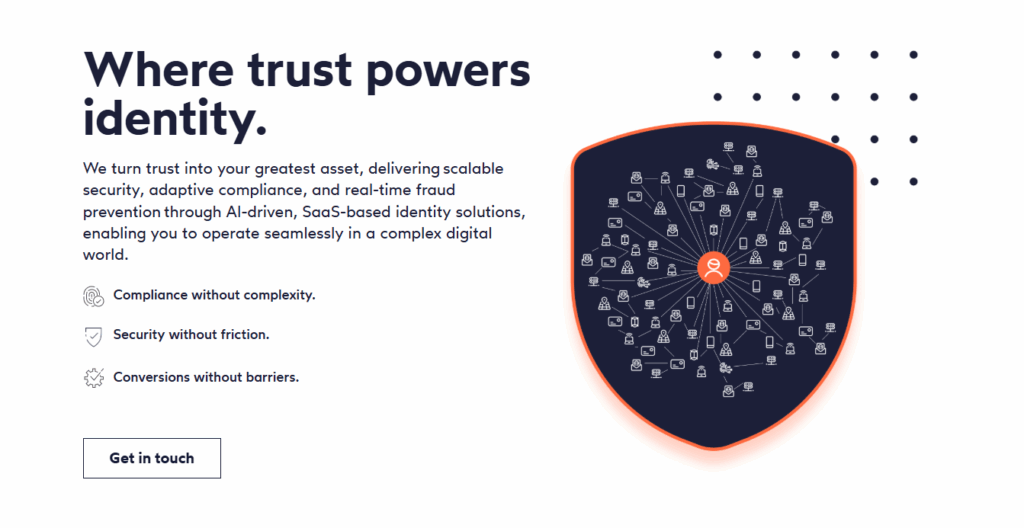
Identity is everything online, and Munich’s IDnow turns that into a science. Their tech handles remote ID verification, from full automation to live video checks. They even add digital signatures, so contracts and onboarding can happen at lightning speed. With compliance demands tightening in Europe, IDnow has become a go-to name in secure, trustworthy verification.
#14 Orbem
Munich-based Orbem is pushing MRI scans (Magnetic Resonance Imaging) into the future. Traditional scans take time and resources; Orbem uses AI to process images faster and more accurately. Their contactless approach also reduces risks for patients. What makes them fascinating is their versatility – this imaging tech can cross over into health, food, and even environmental applications.
#15 Qdrant
Qdrant in Berlin is all about vector search. Sounds technical? It is, but the impact is huge: their open-source engine helps AI systems find patterns and similarities in massive datasets. From recommendation engines to generative models, Qdrant makes search lightning fast and scalable. For developers, it’s like unlocking a turbo mode for handling unstructured data.
#16 Jina AI
If Qdrant is about search speed, Jina AI is about search intelligence. They build neural search frameworks that help businesses make sense of images, videos, and text. Their tech chunks and classifies information, then re-ranks results so you always get what matters most. In a world drowning in data, Jina AI feels like a life raft.
#17 Lengoo
Lengoo’s home is Berlin, but their playground is language. They develop generative AI solutions fine-tuned for sovereign languages and company-specific data. Whether it’s creating content, translating at scale, or digging insights from documents, Lengoo finds ways to make text work harder for businesses. It’s like having your own AI writer trained on your company’s brain.
#18 Apheris
Berlin’s Apheris is obsessed with data privacy. Instead of moving sensitive information around, their federated learning approach analyzes it where it sits. That means companies can collaborate on data without exposing it. With compliance and governance built into the stack, Apheris feels tailor-made for industries like healthcare and finance, where mistakes aren’t an option.
#19 Aignostics
This Berlin startup lives at the intersection of pathology and AI. Aignostics turns complex biomedical images into insights for precision medicine, helping pharma companies accelerate drug discovery and trials. Their multimodal models handle imaging and omics data together, and they’ve built explainable AI methods so doctors and researchers can trust the results. It’s deep science with real-world stakes.
#20 Deepset
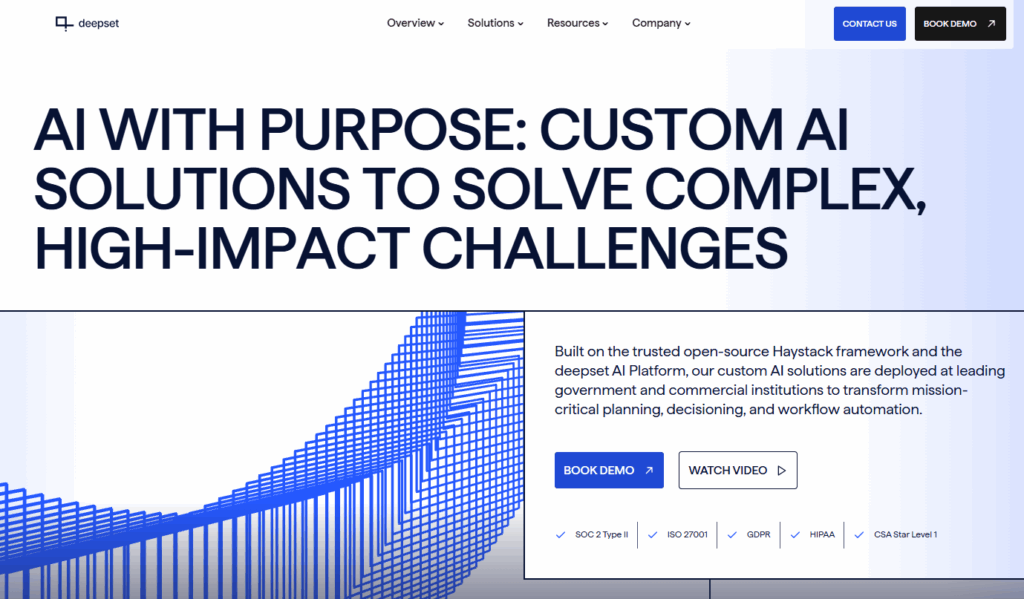
Among the top AI companies in Germany is also Deepset, from Berlin. Their open-source Haystack framework helps developers build custom question-answering systems and language apps. On top of that, Deepset Cloud offers a faster path from prototype to production. For businesses that want AI-powered search or assistants without reinventing the wheel, Deepset is the bridge from research to application.
#21 Black Forest Labs
Down in Freiburg, Black Forest Labs is making noise in generative AI for images and video. Their FLUX tools can mask, remix, or completely reshape visuals with stunning control. From reimagining product photos to experimenting with creative campaigns, they give creators serious power without needing a Hollywood budget.
#22 Hawk AI
Munich’s Hawk AI lives in the finance trenches. Their platform constantly scans transactions to spot shady patterns before they become scandals. Real-time monitoring, risk scoring, and payment screening work together to keep banks and fintechs compliant. In a sector where one mistake can cost millions, Hawk AI brings an always-on safety net.
#23 Dryad
Forests have a new guardian in Dryad. This Berlin-based company plants solar-powered sensors in trees to sniff out gases linked to wildfires. Data beams up to the cloud, where AI filters out false alarms and flags genuine threats. It’s an early-warning system designed to protect both nature and communities.
#24 Endel
Endel, also from Berlin, takes AI into the soundscape. Their app generates music tailored to your state, no matter if you need focus, calm, or better sleep. The trick is that it doesn’t feel generic: the AI adapts based on things like time of day, weather, or even your heartbeat. And it’s all backed by research on how sound affects the mind.
#25 n8n
Automation nerds love n8n. Based in Berlin, it’s a low-code workflow platform that now comes with AI-native features and custom code flexibility. You can build agents that carry out multi-step tasks, plug in your own code if needed, and link with hundreds of apps. It’s like duct tape for digital systems, but with brains.
#26 Hypatos
In Potsdam, Hypatos is rethinking document processing. Their AI agents handle financial paperwork (invoices, claims, receipts) with accuracy that human back offices can’t match. They even have a studio where you can train and tweak agents to match your company’s specific workflows. For accountants and ops teams, it’s a lifesaver.
#27 Cambrium GmbH
Cambrium in Berlin is shaping the future of biotech with lab-grown proteins. Their NovaColl ingredient shows up in cosmetics, bringing collagen without relying on animals. Behind it is generative AI that treats protein design as an optimization puzzle. For industries chasing both sustainability and performance, Cambrium offers a clever answer.
#28 bitsCrunch
Munich-born bitsCrunch sits at the junction of AI and blockchain. They track NFT markets, sniffing out fraud and giving collectors real pricing tools. Their system can spot when volumes are artificially pumped or when assets are shady. It’s a layer of transparency in a market that badly needs it.
#29 German Autolabs
Driving gets safer with Berlin’s German Autolabs. Their voice tech lets drivers send messages or make calls without touching a screen. It even works offline, so you’re not left stranded without data. By turning voice into the primary control, they aim to cut distractions on the road.
#30 Spectrm
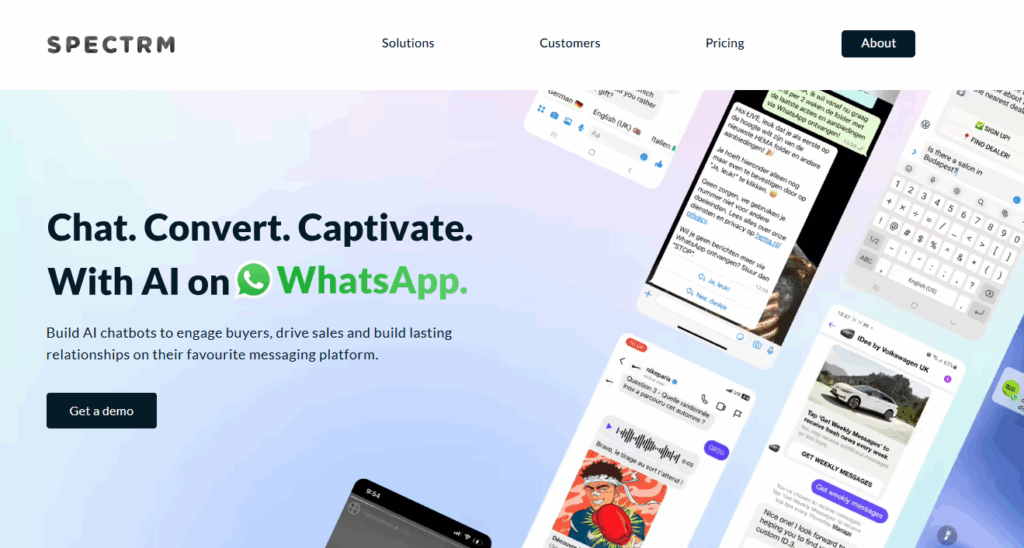
Rounding out the list is Spectrm, another Berlin company reinventing messaging with conversational AI. Their platform plugs directly into apps like WhatsApp or Messenger, letting brands run one-to-one chats at scale. Custom conversation flows and built-in analytics turn casual interactions into insights—and, more importantly, into loyal customers.
What to watch in 2026
Investors are pouring money into German AI like never before, and that means bigger teams, faster rollouts, and yes, more acquisitions. Expect to see some of these startups snapped up by corporates who want AI baked into their business, not bolted on as an afterthought.
There’s also a European flavor to watch for. Partnerships across borders are heating up, with German firms teaming up with French, Dutch, or Nordic players to stay competitive against the US and China. That mix of talent and capital makes the ecosystem feel more connected than ever.
And maybe the most interesting angle: the Mittelstand. Those small and mid-sized German companies that usually stick to tradition are starting to try AI for real. Whether it’s smarter supply chains, predictive maintenance, or customer service chatbots, 2026 could be the year “AI in Germany” stops being just a tech headline and starts reshaping the backbone of the economy.
Final thoughts on AI companies in Germany
When you zoom out, what’s happening in Germany feels steady and grounded. These AI companies focus less on flash and more on building tools that industries can actually use. That’s the detail outsiders often miss.
By 2026, you’ll see more deals, new partnerships, and a wave of Mittelstand companies jumping in. AI in Germany will look less like a collection of experiments and more like part of the country’s economic engine. If the last few years proved anything, it’s that the next steps are going to be bigger than most expect.
***


